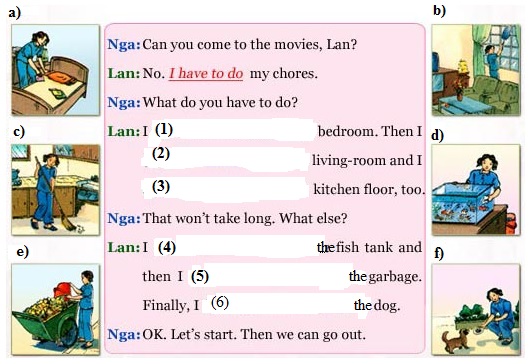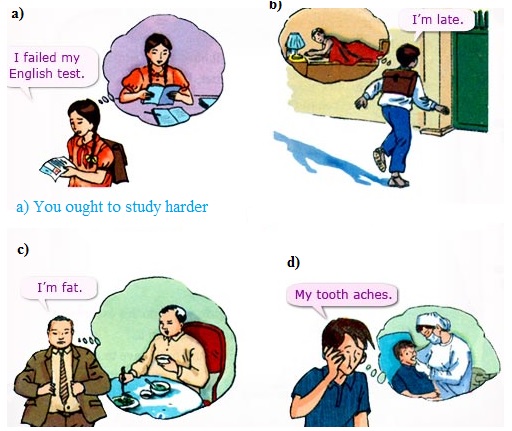Unit 3 lớp 8 Language Focus - Ngữ pháp At home
Tóm tắt bài
1. Grammar Language Focus Unit 3 Lớp 8
1.1. RELEXIVE PRONOUNS (Đại từ phản thân)
a.1. Đại từ phản thân gồm có
Singular (Số ít) Plural (Số nhiều)
Ngôi thứ nhất myself ourselves
Ngôi thứ hai yourself yourselves
Ngôi thứ ba himself/ herself/itself themselves
oneself
a.2. Use (Cách dùng)
Đại từ phản thân diễn tả hành động trở lại với chính người thực hiện. Đại từ phản thân có thể làm
a.2.1. Objects (Túc từ / Tân ngữ).
- Object of a verb (Túc từ của động từ)
Ex: Be careful ! You'll cut yourself. (Hãy cẩn thận. Bạn sẽ bị đứt tay.)
His little son can wash himself. (Đứa con trai nhỏ của anh ấy có thể tự tắm.)
- Object of a preposition (Túc từ của giới từ).
Ex: She looks at herself in the mirror. (Chị ấy soi gương.)
The rich usually think of themselves. (Người giàu thường nghĩ đến bản thân họ.)
a.2.2. Emphasis (Nhấn mạnh)
- Trường hợp này đại từ phản thân còn được gọi là "Đại từ làm mạnh nghĩa" (Emphatic pronouns).
- Đại từ thường đứng ngay sau từ nó làm mạnh nghĩa.
Ex: Mr Green himself took the pupils to the museum. (Chính ông Green đã đưa học sinh đến viện bảo tàng.)
Ann sent this letter itself. (Ann đã gửi chính lá thư này.)
- Nếu đại từ phản thân làm mạnh nghĩa cho chủ từ, nó có thể
- đứng ngay sau chủ từ.
- Ex: This boy himself watered the plants. (Chính đứa con trai này đã tưới các cây kiểng.)
- Mary herself cleaned the floor. (Chính Mary đã lau nhà.)
- đứng ở cuối mệnh đề / câu.
- Ex: This boy watered the plants himself.
- Mary cleaned the floor herself.
- đứng ngay sau chủ từ.
a.2.3. "BY + reflexive pronoun"
- "tự làm" (without help).
Ex: Tom always does the homework by himself. (Tom luôn luôn tự làm bài tập ở nhà.)
Lan made this dress by herself. (Lan tự may cái áo đầm này.)
- "một mình" (alone, on one's own).
Ex: Most of the old people in Viet Nam live by themselves. (Đa số người già ở Việt Nam sống một mình.)
Bill went on holiday last summer by himself. (Mùa hè qua Bill đi nghỉ mát một mình.)
1.2. MUST - HAVE TO - OUGHT TO
b.1. MUST (phải): là trợ động từ (a modal) được dùng diễn tả
- sự bắt buộc hay sự cần thiết có tính chủ quan - do cảm nghĩ của người nói.
- He must do this exercise again. (Anh ấy phải làm bài tập này lại.)
- Ann must be home before 9 pm. (Ann phải có mặt ờ nhà trước 9 giờ tối.)
- tính quy tắc hay về luật
- We must drive on the right. (Chúng ta phải lái xe bên phải.)
- Pupils must get to school on time. (Học sinh phải đến trường đúng giờ.)
b.2. HAVE TO
- diễn tả sự bắt buộc hay sự cần thiết có tính khách quan - do yếu tố bên ngoài.
- Your eyes are weak. You have to wear glasses. (Mắt bạn kém. Bạn phải mang kính.)
- Mother has been in hospital. Mary has to do all the housework. (Mẹ nằm bệnh viện. Mary phải làm tất cả việc nhà.)
b.3. OUGHT TO + V (base form) (nên)
- diễn tả lời khuyên
- We ought to obey our parents. (Chúng ta nên vâng lời cha mẹ.)
- Children ought to respect elderly people. (Trẻ con nên kính trọng người già.)
- OUGHT TO có thể được thay bằng SHOULD
- We should obey our parents.
1.3. QUESTIONS WITH "WHY ". (Câu hỏi với "WHY [tại sao]".)
- Câu hỏi với "Why" được dùng để hỏi về nguyên nhân hay lý do.
Why + do / aux.v + S + Vm + O...?
Why do they cover the electric sockets? (Tại sao họ bao bọc các ổ cắm điện?)
Why can't children play in the kitchen? (Tại sao trẻ con không được chơi trong bếp?)
Để trả lời cho câu hỏi với "WHY", chúng ta có thể dùng
- mệnh đề với "because" ("because" clause)
- Why do you get up early? - Because I want to do exercise. (Tại sao bạn thức dậy sớm? - Vì tôi muốn tập thể dục.)
- cụm động từ nguyên mẫu (infinitive phrase)
- Why do you do exercise? - To keep healthy. (Tại sao bạn tập thể dục? - Để giữ cho khoẻ mạnh.)
2. Exercise Language Focus Unit 3 Lớp 8
2.1. Unit 3 Language Focus Exercise 1
Look at the pictures. Complete the dialogue. Use must or have to and the verbs in the box. (Hãy nhìn tranh và hoàn thành hội thoại sau, sử dụng must hoặc have to và động từ trong khung.)
feed empty do tidy sweep clean dust

Guide to answer
1. must/have to tidy
2. must/have to dust
3. must/have to sweep
4. must/have to clean
5. must/have to empty
6. must/have to feed
2.2. Unit 3 Language Focus Exercise 2
Look at the pictures. Use ought to to give advice to these people. (Em hãy nhìn tranh rồi dùng ought to để khuyên những người này.)

Guide to answer
a. You ought to study harder.
b. You ought to get up earlier.
c. You ought to go on a diet./ You ought to eat more fruit.
d. You ought to go to a dentist.
2.3. Unit 3 Language Focus Exercise 3
Complete the diologues. Use the reflexive pronouns in the box. You will have to use some of the reflexive pronouns more than once. (Em hãy hoàn thành các hội thoại sau, dùng các đại từ phản thân cho ở trong khung. Em sẽ phải dùng một vài đại từ phản thân hơn một lần.)
|
myself yourself himself yourselves herself ourselves themselves |
Guide to answer
a)
Miss. Lien: Did someone help Ba draw that picture?
Bao: No. He did it (0) himself.
b)
Nga: The repairman can't fix the washing machine until tomorrow.
Mrs. Linh: Come on. We'll have to try and do it (1) ourselves.
c)
Aunt Thanh: What's the matter, Hoa?
Hoa: I cut (2) myself.
Aunt Thanh: Let me see. Oh, it's all right. You didn't cut (3) yourself badly.
d)
Lan: Why are you crying, Nga?
Nga: I just watched the movie Romeo and Juliet. The boy killed (4) himself and then the girl killed (5) herself as well.
Lan: Why did they kill (6) themselves?
Nga: It's a long story.
e)
Mr. Nhat: Boys and girls, you'll go this experiment this afternoon.
Students: Will you come to help us?
Mr. Nhat: Yes, I will. But you'll have to do it (7) yourselves first.
2.4. Unit 3 Language Focus Exercise 4
Work with a partner. Ask and answer questions about Hoa, Nam, Ha, Nga, and Mrs. Vui using Why-Because. (Em hãy cùng bạn em hỏi và trả lời câu hỏi về Hoa, Nam. Hà và Nga, dùng Why – Because.)

Guide to answer
a. Why did Hoa go to school late this morning?
Because she watched TV late last night.
b. Why does Nam have to cook dinner?
Because his mother will be home late.
c. Why does Mrs. Thoa/ Nam's mother go home late?
Because she has to come to see her mother. Maybe she's ill.
d. Why did Hoa fail her English exam?
Because she didn't learn her lesson carefully.
e. Why can't Nga go to the movies?
Because she has to clean the house.
Choose the words or phrases that are not correct in Standard English.
1. I must do all the shopping yesterday because the shops are closed today.
A B C D
2. She arrange her desk so that she could reach everything easily.
A B C D
3. I couldn’t move the piano alone, so I asked Tom give me a hand.
A B C D
4. Are you going to let me eating that last piece of blueberry pie?
A B C D
5. Angela must cook a lot of food yesterday because they had a party.
A B C D
Key
1a 2a 3d 4b 5a
Bài tập trắc nghiệm Language Focus Unit 3 Lớp 8
Như vậy các em vừa xem qua nội dung bài học Language Focus Unit 3 tiếng Anh lớp 8, để củng cố nội dung bài học mời các em tham gia Trắc nghiệm Unit 3 lớp 8 Language Focus do HOCTAP247 sưu tầm và biên soạn.
-
Câu 1: Choose the word or phrase that best completes each unfinished sentence below or substitutes for the underlined word or phrase.
They bought ______ a new car.
- A. theyself
- B. theyselves
- C. themselves
- D. themself
-
- A. mustn’t
- B. don’t have to
- C. shouldn’t to
- D. needn’t to
-
- A. mustn’t
- B. have to
- C. doesn’t have to
- D. must
Câu 4 - Câu 10: Xem trắc nghiệm để thi online.
Hỏi đáp Language Focus Unit 3 Lớp 8
Trong quá trình học bài và thực hành trắc nghiệm có điểm nào chưa hiểu các em có thể đặt câu hỏi trong mục Hỏi đáp để được sự hướng dẫn từ cộng đồng HOCTAP247. Chúc các em học tốt!
Bạn có biết?
Tiếng Anh hay Anh Ngữ (English /ˈɪŋɡlɪʃ/ ) là một ngôn ngữ German Tây, được nói từ thời thời Trung cổ tại Anh, ngày nay là lingua franca toàn cầu.Từ English bắt nguồn từ Angle, một trong những bộ tộc German đã di cư đến Anh (chính từ "Angle" lại bắt nguồn từ bán đảo Anglia (Angeln) bên biển Balt)
Nguồn : Wikipedia - Bách khoa toàn thưTâm sự Lớp 8
Lớp 8 - Năm thứ ba ở cấp trung học cơ sở, học tập bắt đầu nặng dần, sang năm lại là năm cuối cấp áp lực lớn dần nhưng các em vẫn phải chú ý sức khỏe nhé!
Nguồn : ADMIN :))Copyright © 2021 HOCTAPSGK
